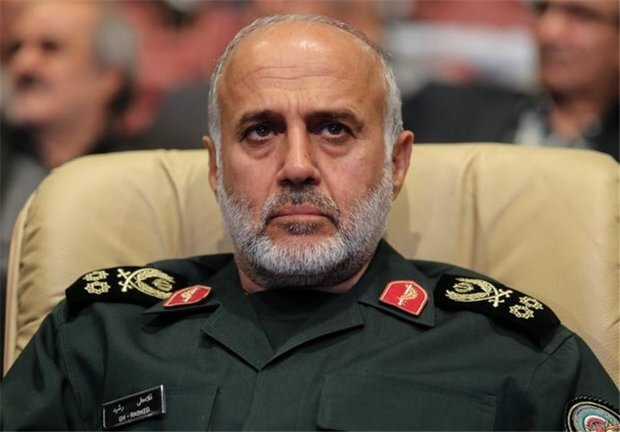Decoding the rare remarks of Khatam al-Anbia headquarters commander

Commander of the Khatam al-Anbia central headquarters warned on Friday that the U.S. should act responsibly to “save the lives of its soldiers” by avoiding wrong behavior in the Persian Gulf region and the Strait of Hormuz.
Commander of the Khatam al-Anbia central headquarters warned on Friday that the U.S. should act responsibly to “save the lives of its soldiers” by avoiding wrong behavior in the Persian Gulf region and the Strait of Hormuz.
Major General Gholam Ali Rashid, who was speaking on the sidelines of air defense drill codenamed Modafean-e Aseman-e Velayat 98 (Defenders of Velayat Sky), also told the U.S. officials that sending message are not enough to stop a possible war. He said proper action and behavior is needed to be taken by Americans.
Rashid stated that Iran’s armed forces, including the Army and Islamic Revolutionary Guard Corps (IRGC), are constantly examining and monitoring the moves of the enemies. The senior general also warned that Iran’s armed forces will use all their tools of powers to confront any threats both the defensively and offensively.
The commander added that we have never been and will never be looking for war, but we decisively defend interests of the Iranian nation and guard our territory against any military threats.
The Khatam al-Anbia central command base is the core of Iran’s armed forces. The headquarters has a mission to monitor offensive and defensive operations in soft and hard aspects, so the remarks by the media-shy commander should be considered very serious.
The tone and content of Rashid’s remarks show that the senior commanders in Iran have come to the conclusion that the country is facing a serious threat.
Although the analysis of the regional conditions and the buildup of foreign military forces in the region does not show any kind of military threat and the assumption is basically rejected for various reasons, the Friday warning by General Rashid to the U.S. suggests that there is a threat with the same effects of a military invasion.
It seems that the threat is referring to a U.S. move to carry out a fourth generation warfare against Iran and its regional partners, a war that its effects will not be less than a military war if successful. The failure of the U.S. “maximum pressure” policy has led Washington and its regional and extra-regional allies to use methods of the fourth generation warfare to create social exhaustion in Iran.
The U.S. actions over the past two months in Iraq, Lebanon and Iran reinforce the assumption that a complicated scenario is at work. It is employing similar tools and methods in the three countries. The scenario, which includes security and military moves as well as domestic unrest, is being waged against the resistance movement. It is based on the strategy of the fourth generation warfare.
The point is that the implementation of each stage of the scenario is on a predetermined element in the region, and the enemy has fully used all its capabilities over these few months. The study of the role of some media outlets like the BBC Persian, Manoto and Iran International as well as the Saudi Global Center for Combating Extremism truly support the assumption.
